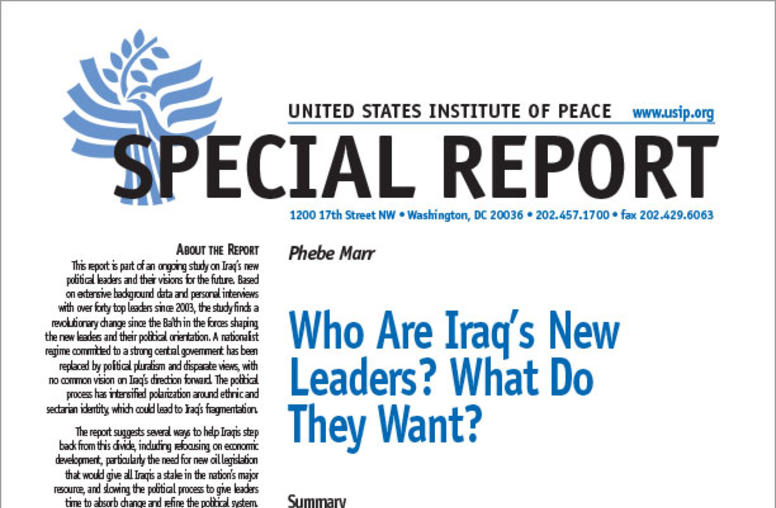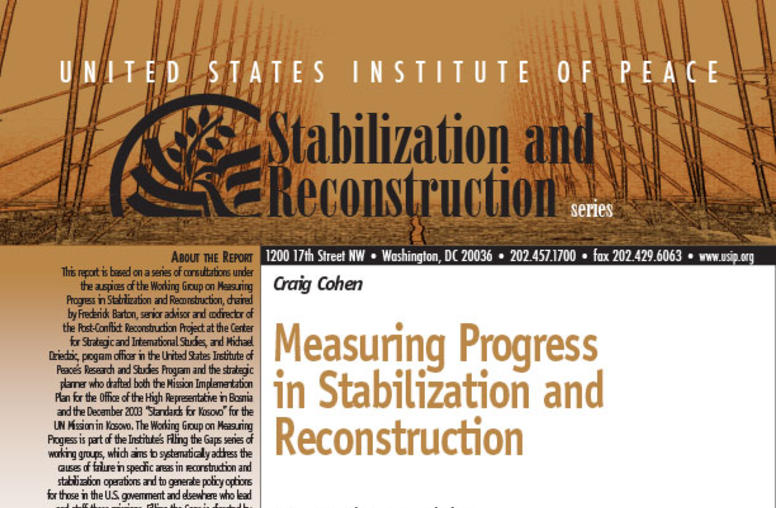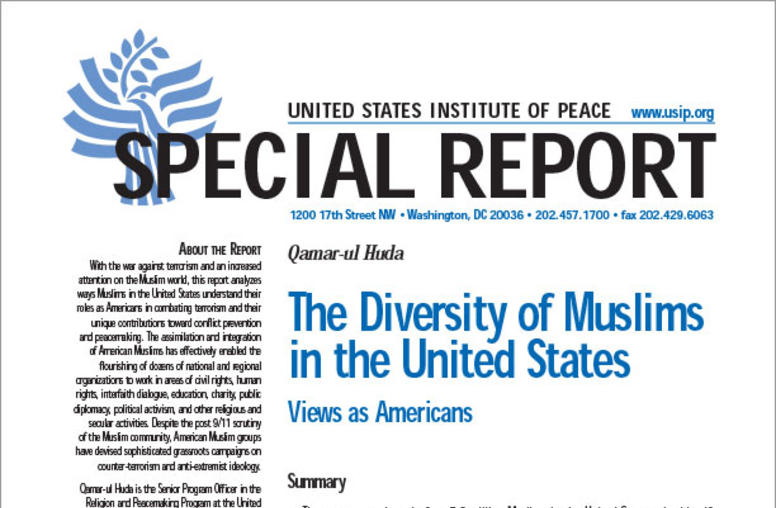Question And Answer
Publications
Articles, publications, books, tools and multimedia features from the U.S. Institute of Peace provide the latest news, analysis, research findings, practitioner guides and reports, all related to the conflict zones and issues that are at the center of the Institute’s work to prevent and reduce violent conflict.

Who Are Iraq's New Leaders? What Do They Want?
USIP's ongoing examination of Iraq's emerging leadership finds a revolutionary change in the forces shaping the new leaders and their political orientation since the end of the Ba'th regime. The report offers several proposals to help Iraqis step back from the current political crisis.

Measuring Progress in Stabilization and Reconstruction
This report is based on series of consultations with the Working Group on Measuring Progress, a part of USIP's "Filling the Gaps" series which aims to systematically address the causes of failure in specific areas in reconstruction and stabilization operations and to generate policy options for those in the U.S. government and elsewhere who lead and staff these missions.
Who Are Iraq's New Leaders? What Do They Want? (Arabic Edition)
Summary Understanding the background and visions of Iraq's new leaders is critical to analyzing where the country may go in the future. Changes in leadership since Saddam have been revolutionary. Among Iraq's new leaders there are virtually no holdovers from the Ba'th era. A "de-Ba'thification" program to remove the old guard reinforces the divide between those who held office before and those who hold it now.
Syria and Political Change II
One year after the assassination of former Lebanese Prime Minister Rafik Hariri and facing mounting international pressure, the Syrian regime is consolidating its hold on power and adopting a more defiant stance, both in the region and toward the West.
Afghan Insurgency Still A Potent Force
With the rise of the insurgency and new insurgent tactics in Afghanistan, the USIP Afghanistan Working Group met to discuss the particularly alarming rise in bloodshed as U.S. forces begin the transfer of control of insurgent-heavy regions of the country to NATO forces this summer.
Afghans, International Community Chart A Joint Path Forward
The Afghan government and international community have charted out a joint strategy to tackle the country’s most pressing challenge: building state institutions. Approved earlier this month at a conference in London, the Afghanistan Compact maps out the country’s way ahead and reaffirms the shared commitment of the international community.
Truth Commission: Liberia
Truth Commission: Truth and Reconciliation Commission of Liberia Duration: 2006 - 2009 Charter: Truth and Reconciliation Commission Act Commissioners: 9 Report: Vol. I (“preliminary report”) issued in December 2008, Vol. II (final but “unedited” report) issued in June 2009. In December 2009, an edited version of Vol. II was re-released together with Vol.III (appendices and specialized reports).

The Diversity of Muslims in the United States: Views as Americans
With the war against terrorism and an increased attention on the Muslim world, this report analyzes ways Muslims in the United States understand their roles as Americans in combating terrorism and their unique contributions toward conflict prevention and peacemaking.
Overcoming Obstacles to Humanitarian Assistance in Darfur
Civilians and internally displaced persons (IDPs) in Darfur are increasingly being attacked by militia groups. What are the challenges of the rising insecurity faced by civilians in Darfur and AMIS? How can the GOS respond, and what are the opportunities for the international community to facilitate humanitarian assistance in Darfur?

Non-Violent Struggle: 50 Crucial Points
This handbook, CD, and website, produced from a USIP grant, describes proven strategies and tactics for nonviolent political movements. Based on first hand experience in Serbia and Georgia, the resources provide easily accessible lessons and best practices to front-line practitioners engaged in struggles for freedom around the world.